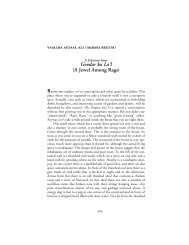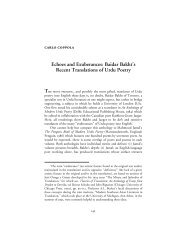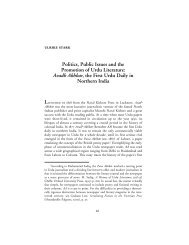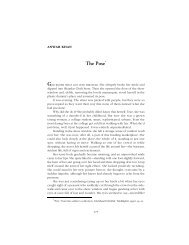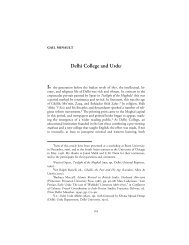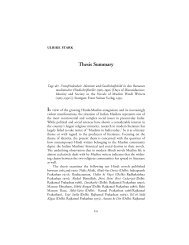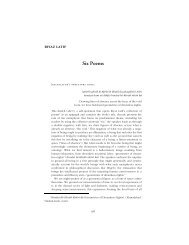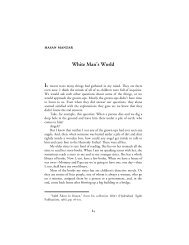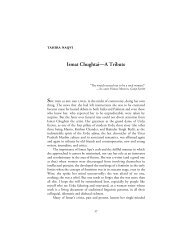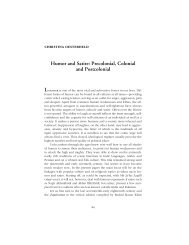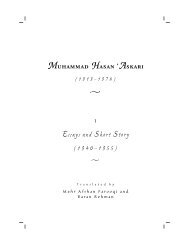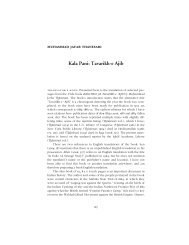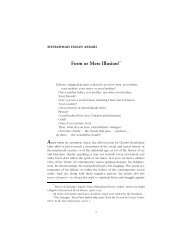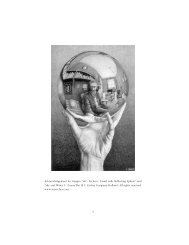Ralph Russell as I Knew Him - the Annual of Urdu Studies
Ralph Russell as I Knew Him - the Annual of Urdu Studies
Ralph Russell as I Knew Him - the Annual of Urdu Studies
Create successful ePaper yourself
Turn your PDF publications into a flip-book with our unique Google optimized e-Paper software.
daniela bredi<strong>Ralph</strong> <strong>Russell</strong> <strong>as</strong> I <strong>Knew</strong> <strong>Him</strong>When pr<strong>of</strong>essor memon invited me to write about <strong>Ralph</strong> <strong>Russell</strong> for <strong>as</strong>pecial section to be published in his memory in <strong>the</strong> AUS, I accepted quiteligh<strong>the</strong>artedly. Upon setting about this t<strong>as</strong>k, however, I realize how hardit is to say something about him that h<strong>as</strong> not already been said by o<strong>the</strong>rs,and in a better way than I may hope to.Marion Molteno, in <strong>the</strong> opening article <strong>of</strong> <strong>Ralph</strong> <strong>Russell</strong>ís collection <strong>of</strong>essays How Not to Write a History <strong>of</strong> <strong>Urdu</strong> Literature, said practically everything<strong>the</strong>re is to say about him <strong>as</strong> a ìTeacher, Scholar and Lover <strong>of</strong><strong>Urdu</strong>î (1999, 3ñ28). Again, in <strong>the</strong> article at <strong>the</strong> end <strong>of</strong> <strong>the</strong> volume <strong>of</strong> studiesin his honor entitled <strong>Urdu</strong> and Muslim South Asia (Shackle 1989, 191ñ200)she told about <strong>the</strong> energy and enthusi<strong>as</strong>m he put into <strong>the</strong> activity hedevoted himself to after an early retirement from <strong>the</strong> School <strong>of</strong> Orientaland African <strong>Studies</strong> (SOAS) in 1981óteaching <strong>Urdu</strong> outside <strong>the</strong> academiccircle and establishing it <strong>as</strong> a fully recognized subject in <strong>the</strong> British schoolsystem.Christopher Shackle, in his introduction to <strong>the</strong> aforementioned festschrift,authoritatively declared <strong>Ralph</strong> <strong>Russell</strong> ìunquestionably <strong>the</strong> outstandingWestern scholar <strong>of</strong> <strong>Urdu</strong> <strong>of</strong> his generation,î who ìsucceeded inworking a magic in bringing his subject to life rivalled by few teachers <strong>of</strong>Middle E<strong>as</strong>tern and Indian languagesî (ibid., 1). Shackleís syn<strong>the</strong>tic andpregnant essay cleverly delineated <strong>Russell</strong>ís salient features, his charisma<strong>as</strong> a teacher and his extraordinary ability <strong>of</strong> concentrating only on what hehimself had defined <strong>as</strong> being genuinely important, making his careerexceptionally consistent. A look at <strong>Ralph</strong> <strong>Russell</strong>ís bibliography is a sufficientconfirmation <strong>of</strong> this statement.The <strong>Annual</strong> <strong>of</strong> <strong>Urdu</strong> <strong>Studies</strong> h<strong>as</strong> published quite a number <strong>of</strong> papersby and about <strong>Ralph</strong> <strong>Russell</strong>. I would like to specially mention hereFrances Pritchettís ìOn <strong>Ralph</strong> <strong>Russell</strong>ís Reading <strong>of</strong> <strong>the</strong> Cl<strong>as</strong>sical Ghazal,îexpounding <strong>the</strong> re<strong>as</strong>ons for her disagreement with <strong>Russell</strong>ís essentiallysociological vision <strong>of</strong> <strong>the</strong> ghazal (1996, 197ñ201), and A<strong>the</strong>r Farouquiísinterview with him (1995, 168ñ74). In <strong>the</strong> latter, <strong>Ralph</strong> w<strong>as</strong> <strong>as</strong>kedóand281
282 • The <strong>Annual</strong> <strong>of</strong> <strong>Urdu</strong> <strong>Studies</strong>fully replied in his usual frank style, going over and over <strong>the</strong> ide<strong>as</strong> whichguided his lifeís workóquestions about <strong>Urdu</strong> in Europe, <strong>the</strong> prejudice <strong>of</strong><strong>the</strong> English against Asians, <strong>Urdu</strong> in India, <strong>Urdu</strong>-speakers identified <strong>as</strong>Muslims, <strong>the</strong> ethos <strong>of</strong> <strong>Urdu</strong> <strong>as</strong> a Muslim ethos, <strong>Urdu</strong> script and literature,<strong>Urdu</strong> literatureís comparison with <strong>the</strong> literatures <strong>of</strong> o<strong>the</strong>r (especiallyWestern) languages, his favorite <strong>Urdu</strong> writers, and <strong>the</strong> production <strong>of</strong> Englishtranslations <strong>of</strong> <strong>Urdu</strong> poetry.More recently, <strong>the</strong> participants in <strong>the</strong> ì<strong>Ralph</strong> <strong>Russell</strong> Dayî held at <strong>the</strong>School <strong>of</strong> Oriental and African <strong>Studies</strong> on 28 June 2007 (Subir Sinha, TalatAhmed, Avril Powell, Alison Safadi, Ian <strong>Russell</strong>, K<strong>as</strong>im Dalvi, MarionMolteno, Nancy Lindisfarne, Francesca Orsini, Daud Ali and RichardHarris) updated this information about his activity in <strong>the</strong> literary andteaching fields. His not so e<strong>as</strong>y relationship with <strong>the</strong> SOAS establishmentw<strong>as</strong> also highlighted.This subject w<strong>as</strong> dealt with again in <strong>the</strong> brief but impressive tribute to<strong>Ralph</strong> <strong>Russell</strong> by Terry Byres, which w<strong>as</strong> circulated in an email dated 22September 2008 from Ian <strong>Russell</strong>. Byres underlined <strong>the</strong> long <strong>as</strong>sociation <strong>of</strong><strong>Ralph</strong> with <strong>the</strong> SOAS and his being an active member <strong>of</strong> <strong>the</strong> BritishCommunist Party for all that time and continued:Despite his outstanding scholarly credentials, he w<strong>as</strong> never made a Pr<strong>of</strong>essor.That w<strong>as</strong> wholly political. It w<strong>as</strong> <strong>the</strong> norm in British universities at <strong>the</strong>time. It w<strong>as</strong> disgraceful.SOAS, indeed, w<strong>as</strong> <strong>the</strong> most reactionary university institution in Britainthroughout <strong>the</strong> period <strong>of</strong> <strong>Ralph</strong>ís time <strong>the</strong>re. For example, it w<strong>as</strong>, I think,<strong>the</strong> only university institution in Britain in which <strong>the</strong> unionó<strong>the</strong> Association<strong>of</strong> University Teachers [AUT]ódid not have <strong>of</strong>ficial recognition(although <strong>the</strong>re w<strong>as</strong> an AUT branch in existence). <strong>Ralph</strong>ís central concernw<strong>as</strong> to bring SOAS on a par with o<strong>the</strong>r university institutions in Britain: inits hiring practices, its employment conditions and what one might call itsworking culture. <strong>Ralph</strong> fought long and hard to achieve that. I, and a fewo<strong>the</strong>rs, joined him in that effort. He, however, w<strong>as</strong> <strong>the</strong> driving force andorganizing genius. He knew SOAS inside out, and w<strong>as</strong> determined to see ittransformed. This w<strong>as</strong> a formidable undertaking, given <strong>the</strong> deeplyingrained attitudes <strong>of</strong> deference among <strong>the</strong> v<strong>as</strong>t majority <strong>of</strong> <strong>the</strong> staff. Whateverchanges took place for <strong>the</strong> better, up to <strong>the</strong> time <strong>of</strong> his retirement,were largely due to his efforts. <strong>Ralph</strong> w<strong>as</strong> a brilliant organizer. He w<strong>as</strong> articulate to a marked degree;and he w<strong>as</strong> indomitable. He w<strong>as</strong> fiercely honest and a loyal friend. It w<strong>as</strong> agreat privilege to have worked with him and to have been his friend.Pr<strong>of</strong>essor C. M. Naim, in his ìSubaltern <strong>Urdu</strong>walaî (2008, n.p.),written <strong>the</strong> day after <strong>Ralph</strong> <strong>Russell</strong>ís p<strong>as</strong>sing, underlined once again <strong>the</strong>terrific contribution he made to <strong>Urdu</strong>, a language he loved to speak
Daniela Bredi • 283without mixing it with English. About his noteworthy human qualities,Naim added:But those who got to know him slightly better also found him remarkableon o<strong>the</strong>r accounts. For me <strong>the</strong> re<strong>as</strong>ons were his intolerance forhumbug. He spoke frankly and firmly, but never arrogantly. I never heardhim make fun <strong>of</strong> someone just for <strong>the</strong> heck <strong>of</strong> it, while he always showedreadiness to laugh with you at some foible <strong>of</strong> his own. Simultaneously, hew<strong>as</strong> a principled man, and always ready to take a position, if he thought itw<strong>as</strong> right, against popular acceptance. His ìprogressivismî w<strong>as</strong> that <strong>of</strong> atrue subaltern and not <strong>of</strong> <strong>the</strong> c<strong>of</strong>fee-house type that prevailed in <strong>Urdu</strong>circles for decades.(ibid.)Dr. Asaduddin, in his tribute for <strong>the</strong> H-ASIA listserv, recalled <strong>Ralph</strong><strong>Russell</strong>ís kindness and generosity along with his ability to disagreewithout being disagreeable and to carry on a rigorous debate withoutpersonal animosity or rancor (2008, n.p.). This quality enabled Pr<strong>of</strong>essorPritchett to pay him homage when she wrote <strong>as</strong> a conclusion to <strong>the</strong>irdebate on <strong>the</strong> <strong>Urdu</strong> ghazal:I have long been grateful to <strong>Ralph</strong> <strong>Russell</strong> for his excellent knowledge <strong>of</strong><strong>the</strong> language and literature, for his lucid and straightforward writing style,for his great scholarly integrityóand even for his heartfelt commitment towhat I find to be a very unsuitable critical methodology. [Ö] I always endup admiring him, and admiring <strong>the</strong> solid achievement <strong>of</strong> his work.(1996, 201)L<strong>as</strong>tly, about himself and his life <strong>Ralph</strong> <strong>Russell</strong> h<strong>as</strong> been very liberal ingiving details in his three-volume autobiography, which he producedduring his l<strong>as</strong>t years. All three volumes (Findings, Keepings: Life, Communismand Everything (2001), Losses Gains (2009), and Some Day Someone(forthcoming)) are described on his website. From this workóor, tobe precise, from <strong>the</strong> first volume, <strong>the</strong> only one that at present I have readóemerge his candor, courage, fighting character, straightforwardness andhis unconditional loyalty to <strong>the</strong> humanist ideals he chose so early in hislife.What more can I say about <strong>Ralph</strong> <strong>Russell</strong>? I cannot do more than givean image <strong>of</strong> him from my particular point <strong>of</strong> view, bring my personalgrain <strong>of</strong> dust to add to his portrait. I have to draw from my memories,especially from what I remember <strong>of</strong> <strong>the</strong> year when I w<strong>as</strong> so lucky <strong>as</strong> tomeet him and become his pupil. I am going to be very personal, but in sodoing, after all, I am going to follow <strong>the</strong> example set by him.The thought <strong>of</strong> <strong>Ralph</strong> brings me back to <strong>the</strong> 1970s. After obtaining my
284 • The <strong>Annual</strong> <strong>of</strong> <strong>Urdu</strong> <strong>Studies</strong>degree in politics from <strong>the</strong> University <strong>of</strong> Turin, I arrived in Rome andstarted my studies with Pr<strong>of</strong>essor Alessandro Bausani. It w<strong>as</strong> from himthat I first heard <strong>of</strong> <strong>Ralph</strong> <strong>Russell</strong>. It is, perhaps, noteworthy that, eventhough my studying and working relationship with Alessandro Bausaniw<strong>as</strong> undoubtedly more continuous and steady, it never occurred to me tocall or refer to him by his first name, while with <strong>Ralph</strong> <strong>the</strong> transition fromìMr. <strong>Russell</strong>î to ì<strong>Ralph</strong>î came e<strong>as</strong>ily and naturally. Of course, this w<strong>as</strong> alsodue to <strong>the</strong> fact that, no matter how friendly Pr<strong>of</strong>essor Bausani might be, Iw<strong>as</strong> always well aware <strong>of</strong> his and my standing in <strong>the</strong> Italian academichierarchy. At SOAS I w<strong>as</strong> a stranger, quite happy to ignore <strong>the</strong> internaldynamics <strong>of</strong> institutional relationships, especially since I w<strong>as</strong> only anocc<strong>as</strong>ional student <strong>the</strong>re.Upon winning a grant from <strong>the</strong> Italian Accademia dei Lincei, <strong>as</strong> anexchange with <strong>the</strong> British Academy, to go to London to pursue mypostgraduate studies, I told Pr<strong>of</strong>essor Bausani that I would seize <strong>the</strong>opportunity to learn <strong>the</strong> <strong>Urdu</strong> he had not taken <strong>the</strong> trouble to teach me.He laughed and told me: ìGo to SOAS and see <strong>Ralph</strong> <strong>Russell</strong>. He enjoysteaching beginners.î Then he told me that Mr. <strong>Russell</strong> w<strong>as</strong> <strong>the</strong> onlyscholar he recognized <strong>as</strong> his peer in <strong>Urdu</strong> studies (modesty had neverbeen among Bausaniís virtues, nor had he ever practiced understatement).He wrote me a letter <strong>of</strong> introduction and gave me his blessing toleave for London.And <strong>the</strong>re I w<strong>as</strong>, looking for Mr. <strong>Russell</strong>ís room in <strong>the</strong> SOAS SouthAsia Department. Apart from what Pr<strong>of</strong>essor Bausani had told me, I knewnothing about him or <strong>Urdu</strong> studies. Wondering what I could say topersuade him to accept me <strong>as</strong> an occ<strong>as</strong>ional student in his <strong>Urdu</strong> cl<strong>as</strong>ses, Iknocked on his door. Inside I found a smiling, white-haired man sitting ata table near <strong>the</strong> window in a room full <strong>of</strong> books and papers. I handed himPr<strong>of</strong>essor Bausaniís letter and, somewhat re<strong>as</strong>sured by his un<strong>as</strong>sumingappearance, waited for his questions. When he lifted his blue eyes, magnifiedby his gl<strong>as</strong>ses, and <strong>as</strong>ked me why I w<strong>as</strong> willing to study with him, Ifrankly told him <strong>of</strong> my unhappy experience with studying <strong>Urdu</strong> in Rome:Pr<strong>of</strong>essor Bausani found teaching languages to beginners very boring so,<strong>as</strong> a starter, he had simply given me <strong>the</strong> <strong>Urdu</strong> alphabet to learn by heartand told me to come back to him after a week. When I returned he put abook under my eyes and <strong>as</strong>ked me to read a few words. Somehow Imanaged to read <strong>the</strong>m. Then he gave me an article <strong>of</strong> his, about <strong>the</strong>ergative ëne,í telling me to read it carefully. When I went back to see him afew days later, he said: ìVery well. Now we can start to read and translatesomething.î I had felt at a loss, especially because <strong>the</strong> grammar I hadfound in <strong>the</strong> department library, Tisdallís Hindustani Grammar, looked
Daniela Bredi • 285not at all simple enough to be studied on my own. And I needed to learn<strong>Urdu</strong>. I w<strong>as</strong> interested in <strong>the</strong> modern South Asian history <strong>of</strong> Muslims. Icould not go on without learning <strong>the</strong> language. <strong>Ralph</strong> found my tale quiteamusing and enrolled me among his students without fur<strong>the</strong>r enquiresabout my university background. Instead, he <strong>as</strong>ked me about politics inItaly, and soon we were chatting about <strong>the</strong> Italian government, <strong>the</strong> ItalianCommunist Party and its secretary at that time, Mr. Berlinguer. He told mehe w<strong>as</strong> a card-holding member <strong>of</strong> <strong>the</strong> British Communist Party, which Iknew w<strong>as</strong> very small. How unusual, I thought. And I felt an immediateliking for such an extraordinary type <strong>of</strong> academic.When I started attending his cl<strong>as</strong>ses, sitting in <strong>the</strong> first row <strong>of</strong> desksnext to my friend, colleague and fellow Italian Franco Coslovi, I found afree and informal atmosphereówhich I likedóand a way <strong>of</strong> teachingcompletely different from what I w<strong>as</strong> used to. In my Italian cl<strong>as</strong>sic lycée Ihad learned Latin and ancient Greek well enough to get good marks, butmy parents had to send me to England every summer if <strong>the</strong>y wanted meto speak English. At university, modern language courses had been taughtin very much <strong>the</strong> same f<strong>as</strong>hion. My friend w<strong>as</strong> a little impatient with <strong>the</strong>focus on spoken <strong>Urdu</strong>, because, <strong>as</strong> he kept remarking under his breathafter having been prompted to answer Mr. <strong>Russell</strong>ís questions in cl<strong>as</strong>s, our(his and my) main objective w<strong>as</strong> <strong>the</strong> reading and understanding <strong>of</strong> texts,but I found it stimulating and refreshing. I re<strong>as</strong>oned that while learning tospeak I w<strong>as</strong> also learning to read and write; <strong>the</strong> texts would come laterand I could always check my understanding <strong>of</strong> <strong>the</strong>m with Pr<strong>of</strong>essorBausani back in Rome. As relaxed <strong>as</strong> <strong>the</strong> atmosphere in <strong>the</strong> cl<strong>as</strong>s mightbe, it w<strong>as</strong> very clear that we were supposed to take things seriously,attending regularly, doing exercises and everything else. Mr. <strong>Russell</strong> didnot mind a little questioningósuch <strong>as</strong> one studentís extremely criticalcomments about <strong>the</strong> formal expressions <strong>of</strong> <strong>Urdu</strong> greetings and <strong>the</strong> likeóbut he surely meant business. He did not refrain from words <strong>of</strong> encouragementand praise on occ<strong>as</strong>ion, but could also be quite harsh in hisrebukes. Most <strong>of</strong> all, from every evidence, he cared about his pupils andenjoyed his teaching work. His enthusi<strong>as</strong>m w<strong>as</strong> infectious. Rarely werewe students able to keep to ourselves. Even <strong>the</strong> most reserved gotinvolved, haltingly trying to express <strong>the</strong>ir thoughts in <strong>the</strong> language <strong>the</strong>ywere picking up. Many years later, recalling our poor efforts at conversation,H<strong>as</strong>tings Donnan, who w<strong>as</strong> to become a pr<strong>of</strong>essor <strong>of</strong> socialanthropology at Queenís University <strong>of</strong> Belf<strong>as</strong>t (Nor<strong>the</strong>rn Ireland), and Ihad a nostalgic laugh.<strong>Ralph</strong> <strong>Russell</strong> believed in what he w<strong>as</strong> doing. He w<strong>as</strong> keen to getpeople <strong>of</strong> different backgrounds to communicate and establish human
286 • The <strong>Annual</strong> <strong>of</strong> <strong>Urdu</strong> <strong>Studies</strong>relationships. He kept reminding us <strong>of</strong> <strong>the</strong> importance <strong>of</strong> mixing withpeople who had <strong>Urdu</strong> <strong>as</strong> <strong>the</strong>ir mo<strong>the</strong>r tongue and <strong>of</strong> getting acquaintedwith <strong>the</strong>ir culture, history and way <strong>of</strong> life. In our cl<strong>as</strong>s <strong>the</strong> studentsattending regularly were all British except for me, Franco Coslovi, and ara<strong>the</strong>r shy girl <strong>of</strong> Punjabi origin. Perhaps because I w<strong>as</strong> <strong>the</strong> only o<strong>the</strong>rnon-British female in <strong>the</strong> cl<strong>as</strong>s, <strong>the</strong> Punjabi student <strong>of</strong>ten came to sit bymy side and I found it natural to smile and talk to her. She grew quitefond <strong>of</strong> me. <strong>Ralph</strong> noticed this and told me how ple<strong>as</strong>ed he w<strong>as</strong> that I hadreadily accepted <strong>the</strong> elder sisterís role this girl had instinctively <strong>as</strong>signedto me and had taken my younger cl<strong>as</strong>smate under my ìprotective wing.îEvery now and <strong>the</strong>n I used to stop by his room for a talk. He seemedto like it, and did not mind <strong>the</strong> w<strong>as</strong>te <strong>of</strong> his time. Among o<strong>the</strong>r things, wediscussed my readings <strong>of</strong> his booksóI had just discovered Three MughalPoets and Ghalib: Life and Letters and w<strong>as</strong> quite enthusi<strong>as</strong>tic about <strong>the</strong>m.He knew I w<strong>as</strong> studying Muslim pe<strong>as</strong>ant upheavals in nor<strong>the</strong>rn India andthat I w<strong>as</strong> looking for materials in <strong>the</strong> India Office Library and Records, atBlackfriars in those days, and he te<strong>as</strong>ed me about my entirely bookishapproach to <strong>the</strong> subject. When I told him that after I w<strong>as</strong> finished with mypresent research I w<strong>as</strong> thinking <strong>of</strong> starting a project about contemporaryPakistani pe<strong>as</strong>ants and <strong>the</strong>ir attitudes toward politics and Islam, he did notput me <strong>of</strong>f, but rightly wondered how an Italian girl, who had never seena Pakistani pe<strong>as</strong>ant in her life, could understand anything about it. I interpretedhis words <strong>as</strong> a challenge: he w<strong>as</strong> suggesting that I should go to seefor myself, <strong>the</strong>n I could make up my mind; perhaps I w<strong>as</strong> being overlyambitious in my project. In my youthful and reckless self-confidence, Itold him that I w<strong>as</strong> willing to experience a Pakistani village. I also toldhim <strong>of</strong> my admiration for Hamza Alavi and his work. A few days later he<strong>as</strong>ked me if I would like to meet him. We could go to Leeds, whereHamza Alavi w<strong>as</strong> living, and I could interview him. I w<strong>as</strong> only to happy toaccept and <strong>of</strong>f we went, one day, by train, but I did not interview <strong>the</strong>famous sociologist, whose articles in <strong>the</strong> New Left Review had such a deepimpact on me. I remained in <strong>the</strong> background listening to <strong>the</strong> two <strong>of</strong> <strong>the</strong>mtalking, somewhat overwhelmed by <strong>the</strong>ir powerful personalities.A little before <strong>the</strong> end <strong>of</strong> <strong>the</strong> <strong>Urdu</strong> course at SOAS, <strong>Ralph</strong> suggested Igo to see Jill Evans, a social worker and friend <strong>of</strong> his, in a nor<strong>the</strong>rnEngland town where a substantial community <strong>of</strong> people from Pakistanivillages lived. She introduced me to R<strong>as</strong>hida, a remarkable widow whobravely chose to remain in England with her two sons after her husbandísdeath and who w<strong>as</strong> ready to put me in touch with her relatives in herhome village. They could receive me <strong>as</strong> a guest, if I wanted to go and staywith <strong>the</strong>m. I seized <strong>the</strong> opportunity. I would go in October and stay until
Daniela Bredi • 287Christm<strong>as</strong> time. It would be my very first experience <strong>of</strong> <strong>the</strong> Subcontinentand I looked forward to it with a mixture <strong>of</strong> excitement and fear. <strong>Ralph</strong>had scheduled a trip to Pakistan and India and w<strong>as</strong> going to be inPakistan at <strong>the</strong> time <strong>of</strong> my arrival. Realizing how scared I might be, here<strong>as</strong>sured me. He would meet me at <strong>the</strong> Islamabad airport and accompanyme to <strong>the</strong> village.And so it w<strong>as</strong>. After a rest and some shoppingóI bought twoshalwar-kamiz that later turned out to be for men not women, much to<strong>the</strong> amusement <strong>of</strong> my hostsówe set <strong>of</strong>f for <strong>the</strong> village <strong>of</strong> Kanyal, GujratDistrict. We went by bus to Sarai Alamgir where we were met andwelcomed by a group from <strong>the</strong> village, <strong>the</strong>n by tonga to Q<strong>as</strong>ba, and l<strong>as</strong>tlyby camel to our final destination. <strong>Ralph</strong> seemed to know people everywhere,and everyone seemed to know him. He enjoyed his popularityand talked in <strong>Urdu</strong> with everybody, <strong>the</strong>ir conversations ranging fromPakistani politics, emigration and Islam (he wrote about it in his articleìIslam in a Pakistan Villageî (1978)), 1 to crops, <strong>the</strong> prices <strong>of</strong> agriculturalproducts, childrenís health and womenís sewing. He stayed in Kanyal formore than a week and every evening <strong>the</strong>re w<strong>as</strong> a ga<strong>the</strong>ring <strong>of</strong> peoplecoming from nearby places to see and greet him. Completely at e<strong>as</strong>e, hesat on his charpoy in <strong>the</strong> courtyard <strong>of</strong> <strong>the</strong> house, where occ<strong>as</strong>ionally somemusicians also came with harmoniums and tabl<strong>as</strong> playing and singing fora good part <strong>of</strong> <strong>the</strong> night. One day I went with <strong>Ralph</strong> to a nearby town tosee one <strong>of</strong> his friends, <strong>the</strong> owner <strong>of</strong> a shop on whose signboard w<strong>as</strong>pompously written ìAsia Engineering Centre.î The man w<strong>as</strong> an activist <strong>of</strong><strong>the</strong> Tehrik-e Istiqlal and he gave me some pamphlets <strong>of</strong> his party ando<strong>the</strong>r things about <strong>the</strong> Pakistan Peopleís Party (PPP). He called <strong>Ralph</strong> hisbē-takalluf friend. On ano<strong>the</strong>r occ<strong>as</strong>ion, I had <strong>the</strong> chance to be presentduring a conversation between <strong>Ralph</strong> and a member <strong>of</strong> <strong>the</strong> Jamaat-eIslami, whose ide<strong>as</strong> met with strong opposition in <strong>the</strong> village.At <strong>the</strong> end <strong>of</strong> his stay in <strong>the</strong> village, <strong>Ralph</strong> took me to Lahore fromwhere he w<strong>as</strong> leaving for India. He introduced me to Ebadat Barelvi andhis family who were so kind <strong>as</strong> to have me <strong>as</strong> <strong>the</strong>ir guest again laterduring my escapes from Kanyal from time to time. To be honest, and tomy regret, I do not remember much about <strong>the</strong>ir conversations with <strong>Ralph</strong>,whe<strong>the</strong>r <strong>the</strong>y touched on literary topics at all. But one thing w<strong>as</strong> absolutelyclear: <strong>the</strong>ir warm friendship and mutual esteem. Once, talking with1 For <strong>the</strong> changed conditions in Punjabi villages see Jugnu Mohsin, ìHowAjmal K<strong>as</strong>ab Took to Radical Islam,î http://www.rediff.com///news/2009/jan/05mumterror-how-ajmal-k<strong>as</strong>ab-took-to-radical-islam.htm (reprinted from The FridayTimes (Lahore)).
288 • The <strong>Annual</strong> <strong>of</strong> <strong>Urdu</strong> <strong>Studies</strong>a young visitoróperhaps a sister-in-lawó<strong>Ralph</strong> touched on <strong>the</strong> subject <strong>of</strong>veiling, <strong>as</strong>king her if she ever covered her head with <strong>the</strong> dupatta she w<strong>as</strong>wearing c<strong>as</strong>ually on her shoulders. The young lady replied no, she didnot, not even in her fa<strong>the</strong>r-in-lawís presence, because respect and honorlay not upon oneís head, but in oneís heart and mind. He w<strong>as</strong> extremelyple<strong>as</strong>ed with her answer.Before leaving, <strong>Ralph</strong> took me to visit <strong>the</strong> editor <strong>of</strong> Viewpoint magazine,Mazhar Ali Khan (Tariq Aliís fa<strong>the</strong>r) at his stylish home, where heand his bright and beautiful wife welcomed us. Sitting on one <strong>of</strong> <strong>the</strong> s<strong>of</strong><strong>as</strong>in a t<strong>as</strong>tefully furnished living-room, I listened to <strong>the</strong>m discussing Islamicsocialism and Zulfikar Ali Bhuttoís policies. On our way back, <strong>Ralph</strong>enquired about my impressions, whe<strong>the</strong>r I had thoughts about left-wingpeople being so well <strong>of</strong>f and living in such style, <strong>as</strong> <strong>of</strong>ten happened inPakistan and India. I thought I detected a slight tinge <strong>of</strong> criticism in hiswords and I remarked that it w<strong>as</strong> not so unusual in Italy ei<strong>the</strong>r. He wenton to say that he found people such <strong>as</strong> <strong>the</strong> Italian Danilo Dolcini, whohad chosen to live among poor workers in Sicily, to be more consistent.After <strong>Ralph</strong>ís departure for India, I went back to <strong>the</strong> village and had agood t<strong>as</strong>te <strong>of</strong> pe<strong>as</strong>ant life. Whe<strong>the</strong>r it w<strong>as</strong> <strong>Ralph</strong>ís intention or not, thatexperience taught me a lesson for life.Since that year, so marked by his teaching and generous example, Ideveloped a deep gratitude and attachment to <strong>Ralph</strong>, with whom I kept intouch, even if a bit discontinuously, until his p<strong>as</strong>sing. Whenever I w<strong>as</strong> inLondon I went to see him and tell him about my studies, my career andmy life. Entering his room at <strong>the</strong> SOAS, until his retirement, or his TheatreStreet home later, I always found him smiling and willing to listen to me,ready to help and give advice, which I regret not having always followed.I do not think it necessary here to underline <strong>Ralph</strong> <strong>Russell</strong>ís merits <strong>as</strong>a translator and <strong>as</strong> a scholar who succeeded in giving his subject <strong>the</strong> placeit deserved inside and outside <strong>the</strong> academic world. Coming from Italyówhere <strong>Urdu</strong> w<strong>as</strong> an almost unknown word until Alessandro Bausanistarted translating Iqbal and Ghalib and wrote his Storia delle Letteraturedel PakistanóI knew only too well <strong>the</strong> difficulties <strong>of</strong> having <strong>Urdu</strong> receiveits proper place among <strong>the</strong> languages taught in Middle E<strong>as</strong>tern andIslamic <strong>Studies</strong>í departments (Arabic, Persian and Turkish). Bausani himselfw<strong>as</strong> mainly a scholar <strong>of</strong> Islam and an Iranist whose genius andamazing talent for languages enabled him to greatly enlarge <strong>the</strong> scope <strong>of</strong><strong>the</strong> discipline <strong>of</strong> Islamic <strong>Studies</strong>, o<strong>the</strong>rwise restricted to <strong>the</strong> main lands <strong>of</strong>Islam. He did pioneering work and planted many seeds in <strong>the</strong> academicfield, but <strong>Urdu</strong> w<strong>as</strong> just one <strong>of</strong> his multiple interests. Used to Bausaniíseclecticism and his intellectual approach, I w<strong>as</strong> struck by <strong>Russell</strong>ís dedi-
Daniela Bredi • 289cation to a single subject and <strong>the</strong> extent <strong>of</strong> his personal involvement.However, I must admit, my Italian background sometimes prevented myfull appreciation <strong>of</strong> his fight to make <strong>Urdu</strong> and its literature understandableand appreciable to an audience <strong>of</strong> ìgeneral readers.î Until recently,conditions in Italy were very different from those in Great Britain. Italyhad not yet experienced a m<strong>as</strong>sive influx <strong>of</strong> immigrants, especially fromMuslim countries and <strong>the</strong> Indian subcontinent. Italian society had not yetundergone <strong>the</strong> transformation that quite quickly made Islam its secondreligion (<strong>as</strong> far <strong>as</strong> number <strong>of</strong> followers), and Italian historical links werewith nor<strong>the</strong>rn Africa not with South Asia. <strong>Urdu</strong> could be, at best, anacademic subject. Now that multiculturalism is an Italian reality <strong>as</strong> well,and a good number <strong>of</strong> immigrants from South Asia live in Italy, I am in abetter position to value <strong>Ralph</strong>ís extraordinary work. I witness every day<strong>the</strong> importance <strong>of</strong> helping people know and understand each o<strong>the</strong>r. Andthis can only be done by reaching <strong>the</strong> ìgeneral readers,î and giving accessto languages <strong>as</strong> alien <strong>as</strong> <strong>Urdu</strong> to Italian social workers, elementary schoolteachers, health service workers, and so on.I regret not having told him this <strong>the</strong> l<strong>as</strong>t time I saw him in <strong>the</strong> firstdays <strong>of</strong> September 2007. I arrived during <strong>the</strong> underground strike andmoving around London w<strong>as</strong> not an e<strong>as</strong>y thing. I finally succeeded inseeing him at Theatre Street and we had our l<strong>as</strong>t conversation. A fewyears had elapsed since my previous visit but he received me with hisusual warmth and affection, mildly scolding me for my laziness in writingletters. I had brought him <strong>the</strong> l<strong>as</strong>t book <strong>of</strong> ano<strong>the</strong>r great friend <strong>of</strong> minewho p<strong>as</strong>sed away in June 2005, Napoleone Colajanni. An economist and aìrevisionistî communist, he had written a sharp analysis <strong>of</strong> <strong>the</strong> ìglobaleconomy,î devoting a good part to China and India. I thought <strong>Ralph</strong>might appreciate it, since, in my opinion, <strong>the</strong> two had a lot in common:communism, <strong>of</strong> course, and a fierce commitment to ideals, a deep intellectualintegrity, frugality <strong>of</strong> life, and an uncompromising temperamentthat could make <strong>the</strong>m occ<strong>as</strong>ionally spiky. We talked about him and mysadness at <strong>the</strong> loss <strong>of</strong> friends. I did not imagine that in a short span <strong>of</strong> timeI w<strong>as</strong> going to lose <strong>Ralph</strong> <strong>as</strong> well.After I returned home we exchanged news regularly by e-mail. Ireceived his weekly journal so I should have been aware <strong>of</strong> his failinghealth, but until <strong>the</strong> very l<strong>as</strong>t I refused to admit that his illness w<strong>as</strong> gettingworse and he w<strong>as</strong> going to leave us. Even in his old age he w<strong>as</strong> so full <strong>of</strong>life and interested in people that it w<strong>as</strong>, and still is, difficult for me toaccept that upon going to London I will not find him at his place, amonghis books and things. It is no mere rhetoric to say that it h<strong>as</strong> been aprivilege to have him <strong>as</strong> a teacher and a friend. Thank you, <strong>Ralph</strong>.
290 • The <strong>Annual</strong> <strong>of</strong> <strong>Urdu</strong> <strong>Studies</strong>Works CitedAsaduddin, M. 2008. ìRemembering <strong>the</strong> Late Pr<strong>of</strong>essor <strong>Ralph</strong> <strong>Russell</strong>.î Tributeposted to <strong>the</strong> H-ASIA mailing list and re-posted to <strong>the</strong> Pipermail list 6October 2008 by Sumit Guha. https://email.rutgers.edu/pipermail/south_<strong>as</strong>ia/2008-October/000484.html.Farouqui, A<strong>the</strong>r. 1995. ìAn Interview with <strong>Ralph</strong> <strong>Russell</strong>.î The <strong>Annual</strong> <strong>of</strong> <strong>Urdu</strong><strong>Studies</strong> 10:168ñ74.Naim, C.M. 2008. ìSubaltern <strong>Urdu</strong>wala.î Accessed online at http://www.chapattimystery.com/archives/university/ralph_russell_1918-2008_subaltern_urduwala.html.Pritchett, Frances W. 1996. ìOn <strong>Ralph</strong> <strong>Russell</strong>ís Reading <strong>of</strong> <strong>the</strong> Cl<strong>as</strong>sical Ghazal.îThe <strong>Annual</strong> <strong>of</strong> <strong>Urdu</strong> <strong>Studies</strong> 11:197ñ201.<strong>Russell</strong>, <strong>Ralph</strong>. 1978. ìIslam in a Pakistan Village: Some Impressions.î In Perspectiveson World Religions. Edited by Robert Jackson. London: SOAS, University<strong>of</strong> London.______.1999. How Not to Write <strong>the</strong> History <strong>of</strong> <strong>Urdu</strong> Literature, and O<strong>the</strong>r Essays on<strong>Urdu</strong> and Islam. Delhi; New York: Oxford University Press.Shackle, Christopher, ed. 1989. <strong>Urdu</strong> and Muslim South Asia, <strong>Studies</strong> in Honour <strong>of</strong><strong>Ralph</strong> <strong>Russell</strong>. London: SOAS.



